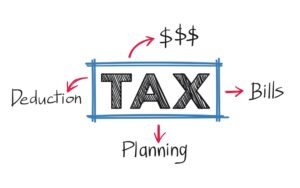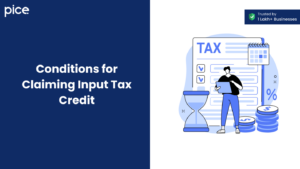GST Rate on Builders and Developers in India
- 20 Aug 24
- 26 mins

GST Rate on Builders and Developers in India
Key Takeaways
- The connected finance ecosystem significantly streamlines financial operations in sectors like construction through advanced process automation.
- Efficient management of GST in construction projects is crucial for optimizing costs and ensuring compliance with tax regulations.
- Utilizing e-way bills in the construction sector helps in the real-time tracking of goods and materials, enhancing logistical efficiency.
- Licensed surveyors and tax professionals play key roles in ensuring accuracy and adherence to financial and regulatory standards in construction projects.
- Leveraging the Input Tax Credit (ITC) effectively can lead to considerable cost savings in construction, making projects more financially viable.
In today's rapidly evolving finance landscape, the connected finance ecosystem plays a crucial role, particularly in sectors like construction where process automation and the integration of various financial services streamline operations significantly.
This ecosystem not only supports the seamless transfer of development rights and efficient management of GST for construction projects but also facilitates the use of e-way bills and optimizes input tax credits (ITC).

Moreover, professionals navigating this ecosystem, from licensed surveyors to tax professionals, rely heavily on advanced tools and software that enhance precision and compliance across activities ranging from the initial budgeting of construction for projects beginning to the final stages of completion.
Such integrations are pivotal in ensuring that the construction of 2BHK flats or large-scale commercial buildings, benefits from streamlined processes and reduced indirect taxes, ultimately contributing to a more robust and efficient Indian finance ecosystem.
The GST rates applicable to builders and developers in India depend on the type of property being constructed and the specifics of the services provided. Here’s an overview of the GST structure for builders and developers as it relates to residential and commercial real estate construction:
Residential Properties
- Affordable housing: GST is levied at a concessional rate of 1% without the benefit of the Input Tax Credit (ITC).
- Non-affordable housing: Residential apartments that do not qualify as affordable apartment housing projects are subject to a GST rate of 5% without the benefit of ITC.
- Commercial Properties
- Commercial real estate: Typically, the GST rate is 12% with ITC. This covers most commercial construction projects, including office buildings, shops, and other commercial units.
- Ongoing Projects under Construction
- For ongoing projects as of the time GST was implemented (July 1, 2017), developers had the option to continue under the old tax regime (Service Tax + VAT) or switch to GST.
- Completion and Sale
It's important to note that GST is not applicable on completed properties that are sold after obtaining the period of completion certificate. The sale of such properties is treated as the sale of immovable property and is exempt from GST.
- Composite Supply
Construction of a complex, building, civil structure, or a part thereof intended for sale to a buyer, wholly or partly, is treated as a supply of services, and GST is applicable. This includes builder services and developer services provided for the construction of residential or commercial spaces.
- Development Rights, TDRs, FSI, and Long Term Lease (premiums)
These are also subject to GST when sold or transferred, typically at the standard rate of 18%, which can impact the overall cost calculations for developers and property buyers.
GST on Construction Materials
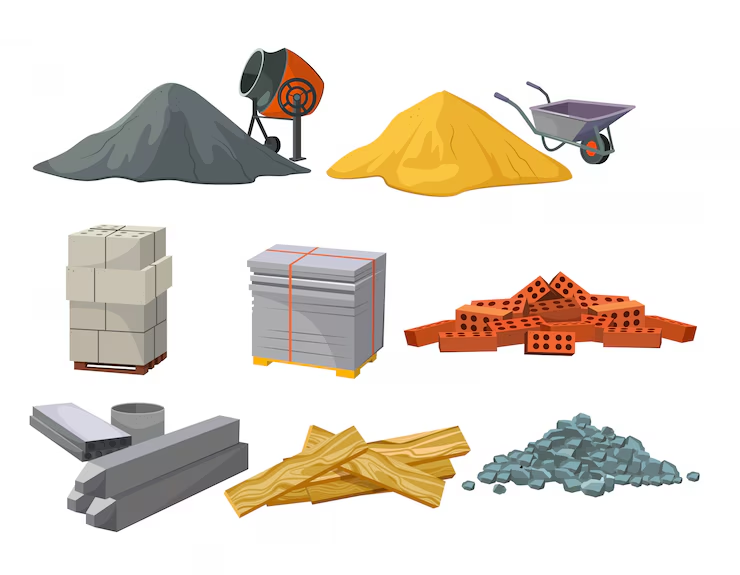
The GST regime has standardized rate of tax across various sectors, including construction. Here, we will explore the different GST rates applied to essential construction materials such as asphaltic rocks, oil shale, natural asphaltites, natural sand, etc.
Rates for Key Materials
Here’s a breakdown of the GST rates for some of the most commonly used construction materials in the real estate sector:
- Cement: Cement is one of the most essential components in construction and attracts a GST rate of 28%. Due to its fundamental role in building durability and strength, cement has one of the highest tax rates among building materials.
- Steel: Used extensively in construction for reinforcement, steel has a GST rate of 18%. Steel's importance in ensuring structural integrity makes it a significant expense in any construction project.
- Tiles and Ceramics: Tiles, including roofing and floor space tiles, are typically taxed at 18%. However, luxury ceramic tiles that are used for aesthetic enhancements might attract a higher rate, depending on their classification.
- Paints and Varnishes: Paints and varnishes, crucial for finishing surfaces in construction, generally attract a GST of 28%. This high rate aligns with their categorization as luxury items within the building materials sector.
- Electrical Fittings: This includes wiring, switches, sockets, and other electrical components essential for the functional setup of a building. These materials are taxed at 18%.
- Sanitaryware: Essential bathroom fixtures like sinks, showers, and toilets usually carry a GST rate of 18%. This rate is applicable to both residential complexes and commercial real estate construction.
- Bricks: Different types of bricks, such as clay bricks, fly ash bricks, and refractory bricks, have varying GST rates, generally between 5% and 18%. The rate depends on the type and use of the brick in construction projects.
- Wood and Plywood: Wood and plywood used in construction attract a GST rate of 18%. This includes materials used for framing, doors, windows, and interior aesthetics.
- Glass: Glass used in building construction, especially for windows and facades, is taxed at 18%.
- Plumbing and Water Supply Materials: Pipes and other plumbing materials essential for water supply and sanitation in buildings are also taxed at 18%.
These GST rates are essential to consider as they directly impact the total cost of construction projects. Proper planning and budgeting, taking these numerous taxes into account, can help in managing overall project expenses effectively.
Property Types and GST
In the Goods and Services Tax (GST) framework in India, properties are broadly categorized into two types: immovable and movable. The GST implications for each category are distinct, reflecting their differences in nature and utility. Here's a detailed look at how GST applies to these possession of property types:
- Immovable Properties
Immovable properties include land and buildings that are permanently fixed to the earth. The GST treatment for immovable properties is as follows:
- Sale of Land: The sale of vacant land or land without any construction is exempt from GST. This exclusion from GST is based on the idea that the sale of land does not involve any value addition or service component, which are typically taxable under GST.
- Sale of Completed Buildings: The sale of completed buildings or ready-to-move-in properties is also exempt from GST, provided the sale occurs after the issuance of a completion certificate by the competent authority. Once a property is considered complete and the completation certificate is issued, it is no longer seen as a supply of service (which would be taxable under GST) but rather as a sale of immovable property.
- Under Construction Properties: For properties that are under construction at the time of possession or sale (i.e., before the issuance of the completion certificate), GST is applicable. The rate depends on whether the property is categorized as affordable housing (1% without input tax credit) or non-affordable housing (5% without input tax credit). These rates were revised to make housing more affordable by removing the ITC, thereby expecting the developers to pass on the benefit of the cost reduction to the buyers.
- Movable Properties
- Movable properties in the context of GST typically refer to those constructed assets that can be relocated from one place to another. Examples include prefabricated homes and mobile homes. The GST implications for movable properties are as follows:
- Supply of Movable Properties: The supply of movable properties, such as prefabricated homes or structures that can be dismantled and relocated, is subject to GST. The rate of GST depends on the type of movable property and the materials used in its construction. Typically, the GST rate for such supplies could range from 18% to 28%, depending on the specifics.
- Installation Services: If the movable property also involves installation services (e.g., assembly of a prefabricated home at a site), these services are generally considered as part of the overall supply and are taxed at the same rate as the movable property itself.
Implications for Developers and Buyers
Understanding these classifications and the applicable GST rates is crucial for both developers and buyers:
Developers need to be aware of the GST implications to manage cash flow effectively, price their properties correctly, and ensure compliance with tax laws.
Buyers should be informed about the GST rates, as they significantly affect the overall cost of purchasing a property, especially in the case of under-construction properties where GST is applicable.
Commencement Certificate
A commencement certificate is a crucial document that a local municipal authority issues to authorize the start of property construction or reconstruction. It confirms that the project has met all the legal, safety, and regulatory standards set by the authority. Without this certificate, construction work is deemed unauthorized and can lead to legal penalties.
Impact on Pricing
Various tax rates and regulations have an impact on the pricing of commercial apartments in the context of India's GST (Goods and Services Tax). The impact of GST on the pricing of commercial properties is significant due to the inclusion of multiple services and materials that are taxed differently.
Here’s a breakdown of how GST affects the pricing of commercial apartments, considering the key aspects of construction, materials, and services involved:
- GST Rates on Construction Materials
For commercial apartments, the cost heavily relies on the prices of construction materials, each bearing its own GST rate:
- Cement: Attracts a high GST of 28%, significantly influencing overall building expenses.
- Steel: Taxed at 18%, a crucial component for structural integrity.
- Electrical fittings and fixtures: Also come under a GST of 18%.
- Tiles, Paints, and Sanitaryware: Are generally levied at 18%, but luxury variants might be taxed higher.
- GST on Construction Services
The construction services involved in building commercial apartments are taxed at 18%. This includes services provided by contractors, architects, and engineers, which form a substantial part of the project's cost.
- Commercial Property Transactions
- Under Construction Properties: Sale of under-construction commercial properties is subject to GST. The applicable rate is generally around 12%, with input tax credit (ITC) available for developers, which can mitigate some of the GST burden.
- Completed Properties: The sale of completed properties, where the completion certificate has been issued before the sale, is exempt from GST. This can make completed units more financially attractive to buyers compared to those under construction.
- Lease and Rentals
Leasing or renting of commercial properties is subject to GST at varying rates depending on the value of the property and the terms of the lease of land. This ongoing cost can affect investment returns and operational costs for businesses occupying commercial spaces.
Impact on Developers and Investors
Developers and investors need to account for GST during the pricing strategy of commercial apartments. The ability to claim ITC on construction flat costs provides some relief, but the overall financial planning must carefully consider the GST implications to ensure profitability and market competitiveness.
Additional Charges
Other components, such as legal charges, registration charges and fees, and brokerage services related to the sale and purchase of commercial properties, are also subject to GST. These additional expenses can add up and impact the final price of the property.
GST Rate on Construction Services
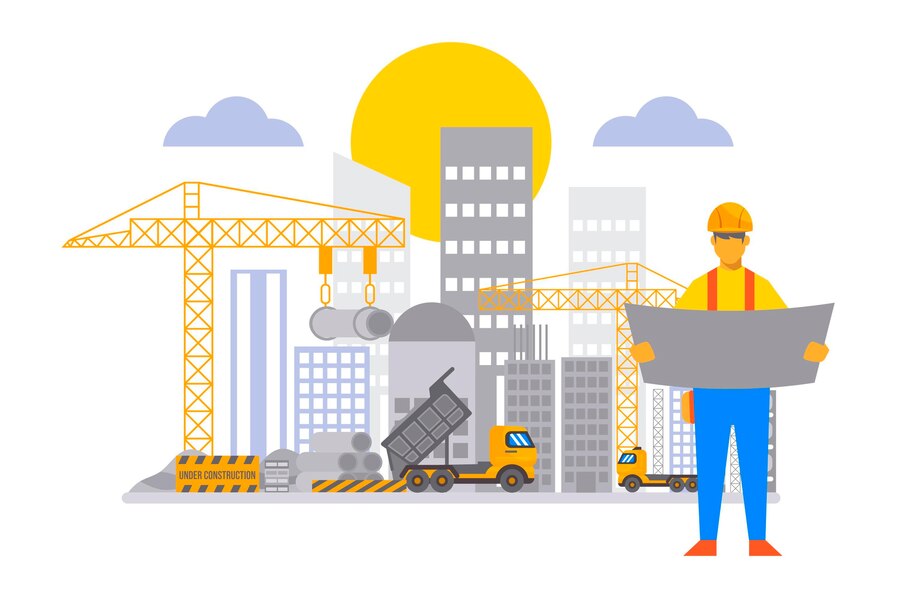
The rate applied to construction services, specifically those related to contracts for building commercial and residential properties, plays a crucial role in the financial planning and tax/secretarial compliance of construction projects. Here’s a detailed look at the GST rates applicable to construction services under contract:
GST for construction of house
Construction services encompass a wide range of activities and are essential for the development of complex residential and commercial real estate. The GST rate on these services is determined based on several factors, including the type of property being constructed and the specifics of the contract. The standard rates are as follows:
- General Construction Services
The GST rate for general activity of construction services, including labor, building materials (supplied as a part of services), and other related services, is typically 18%. This rate applies when the contractor supplies both materials and services as a single supply, which is common in contract sale agreements.
- Composite Supply of Works Contract
Works contract services, which are composite supplies of goods and services in the construction of immovable property, attract a GST rate of 18%. This is applicable to both residential and commercial properties that are not classified under affordable housing.
- Affordable Housing Projects
For construction services related to affordable housing projects, the GST rate is reduced to 12%, and with the benefit of input tax credits, it further helps in promoting entire projects of affordable housing under government schemes.
- Complexes, Buildings, Civil Structures
Construction of residential house, complexes, buildings, or civil structures intended for sale to a buyer, partly or wholly, except where the entire consideration is received after issuance of completion of certificate, is taxed at the rate of 5% without input tax credit.
Impact on Pricing and Project Costs
The inclusion of GST on large-scale construction services significantly impacts the overall pricing and cost structure of construction projects.
- Increased Transparency: GST has brought more transparency to the industry, with a clear demarcation of tax rates and the elimination of multiple taxations, such as VAT and service tax, which were prevalent before GST.
- Input Tax Credit (ITC): If developers are eligible for ITC on the GST paid on input services, this can lower the actual cost of building a new piece of land, provided that the buyers receive these credits in the form of lower prices.
- Cost of Compliance: While GST has simplified the tax structure, it has also increased the compliance burden for contractors and developers, who must ensure accurate GST invoicing, filing of returns, and record-keeping.
Challenges and Considerations
- Rate Fluctuations: Changes in GST rates or tax policies can affect ongoing projects, requiring adjustments in project budgets and pricing strategies.
- Classification Issues: Determining whether a supply is a works contract or a mixed supply can be complex and may lead to disputes with tax authorities.
- Reverse Charge Mechanism: Certain services under construction contracts may fall under the reverse charge mechanism, where the recipient of the service is liable to pay GST, adding another layer of complexity to tax handling.
HSN Code in Construction Services
The HSN code system helps in identifying the rate of GST applicable to different services. For construction, these codes are crucial for tax filings and business compliance.
| HSN Code | Description of Service | GST Rate |
|---|---|---|
| 9954 | Construction services of buildings | 18% |
| 995411 | Construction services of single-dwelling, multi-dwelling or multi-story residential buildings | 5% (12% for input tax credit) |
| 995412 | Construction services of other residential buildings such as old age homes, homeless shelters, hostels, etc | 18% |
| 995413 | Construction services of industrial buildings such as warehouses, workshops, factories, etc. | 18% |
| 995414 | Construction services of commercial buildings such as office buildings, exhibitions halls, etc. | 18% |
| 995415 | Construction services of other non-residential buildings such as schools, public halls, etc. | 18% |
| 995421 | Services involving General construction services of highways, streets, roads, railways, and airfield runways | 12% |
| 995422 | General construction services of bridges, elevated highways, tunnels, and subways | 12% |
| 995423 | General construction services of harbours, waterways, dams, water mains and lines, irrigation, and other waterworks | 12% |
| 995424 | General construction services of long-distance underground/overground/underwater pipelines, communication, and electric power lines (cable laying) | 12% |
| 995425 | General construction services of local water & sewage pipelines, electricity, and communication cables; ancillary works | 12% |
| 995426 | General construction services of mines and industrial plants | 18% |
| 995427 | General construction services of outdoor sports and recreation common facilities charges | 18% |
| 995429 | Other general construction services, n.e.c. (not elsewhere classified) | 18% |
| 995431 | Site preparation services for mining (excluding oil and gas) | 18% |
| 995432 | Site preparation services for construction | 18% |
| 995433 | Excavating and earthmoving services | 18% |
| 995434 | Water well drilling services and septic system installation services | 18% |
| 995435 | Other site preparation services not elsewhere classified | 18% |
GST Rates on Real Estate Projects
In India, the Goods and Services Tax (GST) system imposes different rates on real estate projects, which vary based on the type of project and its intended use. Below is a detailed explanation of the GST rates applicable to various types of construction activities, incorporating keywords for enhanced clarity and SEO optimization:

GST Rates on Different Types of Real Estate Projects
- Residential Real Estate Projects
- Affordable Housing: Projects that qualify under government schemes for affordable housing are subject to a reduced GST rate of 1% without Input Tax Credit (ITC). This incentive is designed to make housing more accessible to lower-income families.
- Non-Affordable Housing: Other residential projects that do not qualify as affordable housing scheme are taxed at 5% without ITC. This rate applies to the sale of under-construction residential units.
- Commercial Real Estate Projects
- Commercial Properties: These include office spaces, shops, and other commercial units, which are generally subject to a GST rate of 12% with ITC. This rate facilitates the recovery of GST paid on inputs, which can significantly affect the overall cost efficiency for developers.
- Mixed-Use Projects
- Mixed-Use Developments: Projects that include both residential and commercial units are taxed based on the proportion of commercial versus residential space. Typically, the commercial portion is taxed at 12% with ITC, while the residential part is taxed at the rates applicable to residential properties (1% or 5% without ITC).
Impact on Pricing and Market Dynamics
The application of GST on real estate projects influences several aspects:
- Project Cost: The inclusion of GST payment affects the overall cost of development, impacting the pricing strategies employed by developers.
- Input Tax Credit: The availability of ITC for commercial projects encourages developers to undertake more commercial and mixed-use developments, as they can offset the GST paid on inputs against their tax liability.
- Cash Flow Management: For projects under construction, the GST regular payment is part of the project's working capital, necessitating effective cash flow management to ensure project viability.
- Consumer Prices: Ultimately, the GST rates impact the price consumers pay for purchasing residential or commercial units, influencing demand and sales dynamics in the real estate market.
Compliance and Challenges
Real estate developers must navigate various direct tax compliance challenges associated with GST, including:
- Accurate Classification: Correctly determining whether a project qualifies for affordable housing benefits is crucial for applying the correct GST rate.
- Documentation and Invoicing: Maintaining detailed records and issuing compliant invoices that reflect the correct GST rates and ITC eligibility.
- Filing Returns: Timely and accurate filing of GST returns is essential to avoid penalties and ensure smooth cash flow management.
Affordable Housing
Affordable housing projects in India are given special consideration under the GST framework to make housing more accessible to lower and middle-income groups. Here's an overview of the GST rates applicable to affordable housing projects and their impact on various aspects of the real estate sector:
GST Rate on Affordable Housing
GST Rate: The concessional GST rate for affordable housing is 1% without the availability of an Input Tax Credit (ITC). This reduced rate is applicable only to those residential projects which qualify as affordable housing under government schemes.
Criteria for Affordable Housing
- Size Criteria: The size of the residential unit must meet specific criteria, which vary depending on the location:
- Metropolitan Cities: For cities like Delhi NCR, Mumbai, Kolkata, Chennai, Hyderabad, and Bangalore, the carpet area of the apartments should be up to 60 square meters.
- Non-Metropolitan Cities: For other cities, the limit is 90 square meters.
- Price Criteria: The cost of the apartment is also capped at ₹45 lakh across India, ensuring that the housing remains affordable to the target demographic.
Implications of GST on Affordable Housing
- Cost Implications for Developers: While the lower GST rate reduces the tax burden, the inability to claim ITC increases the effective cost of construction materials and services. Developers need to carefully manage their costs to maintain profitability.
- Pricing for Buyers: The reduced GST rate is intended to make purchasing homes more affordable for buyers, as it lowers the overall cost of the property.
- Compliance and Documentation: Developers must ensure they meet all criteria laid out for affordable housing projects to benefit from the reduced GST rate. This includes adhering to the specified apartment sizes and price caps and obtaining the necessary certifications from government authorities.
Benefits to the Economy
- Stimulating Demand: Lower GST rates make affordable housing projects more attractive to buyers, potentially increasing demand in the real estate sector.
- Encouraging Development: The special provisions under GST encourage developers to focus on and invest in affordable housing projects, which is a critical need in India.
Challenges
- Project Qualification: Determining whether a project qualifies as affordable housing can sometimes be complex, involving specific measurements and pricing strategies.
- Financial Planning: Developers must adapt their financial strategies to account for the non-availability of ITC, which can affect the overall financial viability of projects.
Legal Judgments on GST in Construction

Legal judgments concerning GST in the construction sector have clarified various aspects of how this tax is applied to different services and transactions.
These judgments help in understanding the GST framework's application in practical scenarios, often influencing the tax liabilities of stakeholders in the construction industry. Here are some notable legal judgments related to GST in construction:
Classification of Property as Goods or Services
- Judgment: Courts have clarified that the construction of a building project or a civil structure or a part thereof, including a complex or building intended for sale to a buyer, is treated as a supply of service. This clarification is crucial for determining GST implications.
- Implication: This helps in applying the correct GST rate and understanding the eligibility for Input Tax Credit (ITC).
Input Tax Credit on Construction Services
- Judgment: The eligibility for claiming ITC on goods and services used in the construction of immovable property (other than plant and machinery) has been a significant issue. The courts have upheld that ITC is not available for goods and services received by a taxpayer for the construction of immovable property on his own account.
- Implication: This judgment impacts developers and property owners by increasing the cost of projects where GST paid on inputs cannot be recovered.
GST on Transfer of Development Rights (TDR)
- Judgment: Various rulings have clarified the application of GST to the transfer of development rights, stating that GST is applicable on TDRs used for the construction of residential and commercial spaces that developers later sell.
- Implication: This has significant implications for pricing and tax compliance in projects involving TDRs, affecting the overall financial planning of real estate projects.
GST on Long-Term Lease Premiums
- Judgment: It has been clarified that GST applies to upfront lease premiums or one-time lease minor charges paid for long-term leases. This decision has significant implications for businesses and individuals entering into long-term lease agreements for sale.
- Implication: Knowing this allows businesses to properly account for GST liabilities on lease agreements and adjust their financial strategies accordingly.
Post-Completion Sale of Property
- Judgment: Sales of completed properties, i.e., after the issuance of a completion certificate, have been ruled as exempt from GST. This ruling distinguishes between under-construction and completed properties regarding GST applicability.
- Implication: This encourages the sale of completed units and provides clarity to buyers and sellers about the tax implications of property transactions.
GST on Affordable Housing
- Judgment: Specific judgments have reinforced the applicability of concessional GST rates on affordable housing projects, aligning with government objectives to promote affordable housing.
- Implication: This supports the government’s initiatives by making affordable housing more attractive to developers and accessible to the target population.
ITC in Construction
Input Tax Credit (ITC) in the construction sector under the Goods and Services Tax (GST) regime in India plays a critical role in defining the financial dynamics of construction projects. Understanding the rules and limitations of ITC can significantly impact cost efficiencies and tax liabilities rate for builder and developers.
Here’s a detailed exploration of ITC in the construction industry:
Overview of ITC in Construction
ITC allows developers and builders to claim a credit for the GST paid on inputs (goods and services used in the production of an output service or good). However, the eligibility to claim ITC comes with specific conditions and restrictions, particularly in the construction sector.
Eligibility for ITC in Construction
ITC on Commercial Construction:
- Allowed: Builders can claim ITC on commercial properties where the property is further leased or sold, subject to GST.
- Condition: ITC is available only until the issuance of the certificate or first occupation, whichever is earlier.
ITC on Residential Construction:
- Restricted: For residential properties, ITC is generally not available if the constructed property is intended for sale post-completion certificate issuance or after first occupation.
- Exception: ITC is available for residential segments in a project if such segments are sold before the completion of certificate is issued and GST is payable on such sale.
Restrictions on ITC
- Non-eligibility: ITC is not available for construction of immovable property (other than plant and machinery) when it is an expense charged to the profit and loss account.
- Blocked Credits: Section 17(5) of the CGST Act blocks ITC on goods and services received by a taxpayer for constructing an immovable property on his own account, even if used in the course or furtherance of business.
Impact of ITC on Project Costing
- Cost Reduction: Availability of ITC can significantly reduce the cost of construction as it allows developers to claim back the GST paid on inputs, thereby reducing the net cost of the project.
- Pricing Strategy: The ability to claim ITC influences the pricing strategies of developers. Projects where ITC is available tend to have a lower price due to reduced tax costs.
Compliance and Documentation
- Documentation: Maintaining proper invoices and documentation is crucial for claiming ITC. This includes ensuring that all suppliers are GST-compliant and invoices are correctly issued.
- Reconciliation: In order to guarantee that the tax authorities properly accept and validate the excess credits claimed, regular reconciliation of input credits with GST returns submitted by suppliers (through GSTR-2A/2B) is necessary.
ITC on Construction Materials
ITC on construction materials is applicable under GST for businesses involved in the construction unit of new structures or the renovation of existing structures that are used for business or commercial purposes. However, there are specific restrictions and conditions for its application.
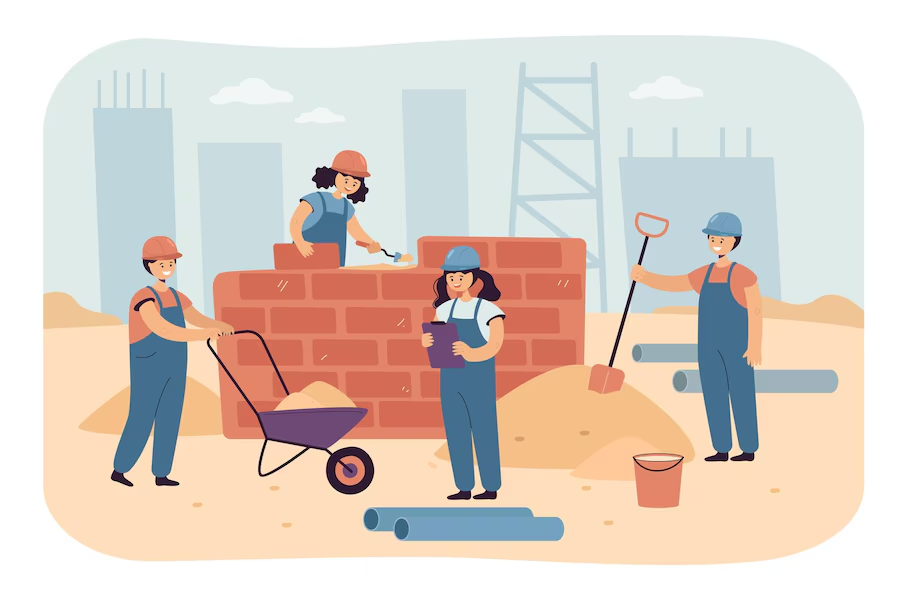
Eligibility for ITC in Construction
- Eligible Entities: Only those registered under GST and engaged in taxable supply of goods or services can claim ITC. This includes construction companies, contractors, and developers.
- Condition for Eligibility: ITC can be claimed on construction materials if the end product (building or structure) is intended for sale before the issuance of the completion certificate or is for lease or rent.
- Exclusions: ITC is not available for construction materials used in the construction of an immovable property (other than plant and machinery), where such construction is an expense that relevantly forms part of the 'cost of capital' or is used for personal consumption.
Key Construction Materials Eligible for ITC
- Cement: used in almost all types of construction projects.
- Steel: essential for structural frameworks.
- Sand and Crushed Stones: The basic components used in building foundations and other structures are building stones.
- Electrical Fittings: This includes wiring, sockets, and switches used in the electrical setup of buildings.
- Plumbing Materials: Pipes, faucets, and other plumbing essentials.
- Paint and other finishes are used in the final finishing of buildings.
Restrictions on ITC
- No ITC on Completion: If the property is sold after obtaining the completion certificate, ITC is not applicable.
- Permanent Transfer of Business: ITC cannot be claimed if there is a permanent transfer of property ownership of the business.
- Blocked Credits: Certain expenses, like those on immovable property, unless they are plant and machinery, do not qualify for ITC.
Documentation for Claiming ITC
- Invoices: Proper GST-compliant invoices from vendors are mandatory.
- GST Returns: Regular filing of GST returns (GSTR-1, GSTR-2A, and GSTR-3B) is necessary to claim ITC.
- Reconciliation: Regular reconciliation of credit claims with the credit available as per GST portal records is required to ensure compliance and avoid penalties.
Impact of ITC on Project Costing
The ability to claim ITC can significantly reduce the cost burden of GST on construction projects. By recovering the GST paid on inputs, developers and builders can reduce the overall project costs, potentially leading to lower prices for end consumers or higher margins for developers.
Conclusion
The implementation of GST has significantly reshaped the construction industry in India, simplifying tax structures and enhancing transparency. While the GST regime offers benefits like the Input Tax Credit (ITC), which can mitigate some cost burdens, restrictions on ITC availability have raised challenges, particularly in residential construction.
The reduced GST rates for affordable housing space align with government initiatives to promote accessibility but require strict compliance from developers. Overall, GST presents both opportunities and complexities, necessitating informed and adaptive strategies by stakeholders in the construction sector for sustainable growth and profitability.
Looking for the right GST billing software for business management. Choose Pice as it is the best GST software that meets every business’s specific needs and helps ease the burden of GST compliance.
 By
By 









